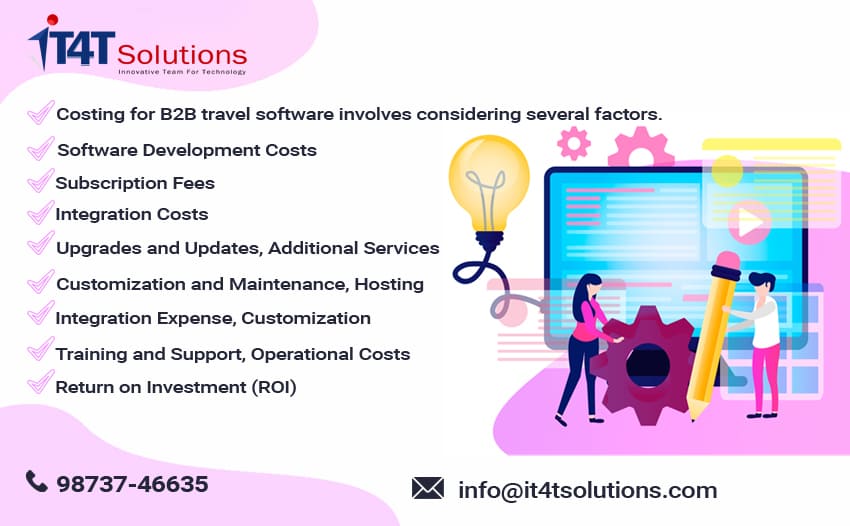There are several factors to consider when conducting a cost analysis for B2B travel software. Some points always play a critical part when evaluating the cost of good travel software. According to it4tSolutions, there are some main points that are very important for B2B travel software, we will discuss them, and we will know about B2B travel software cost in detail. And most important here let me tell you one main thing the cost of B2B travel software depends on the needs of the customer and the work.
Software Development Costs: This includes the cost of developing the B2B travel software solution. It can vary based on the complexity of the software, the features required, and the development approach (in-house development or outsourcing to a third-party vendor). Factors such as project scope, development time, and team size will influence the cost.
Subscription Fees: Many B2B travel software solutions are offered under subscription models. The cost will depend on the software’s functionality, and the number of users or transactions allowed. Fees can be one-time payments, annual charges, or monthly subscriptions.
Integration Costs: B2B travel software often needs to integrate with existing systems like accounting software, customer relationship management (CRM) platforms, payment gateways, or third-party APIs. Integration costs can include development efforts, data migration, and testing.
Customization and Maintenance: Depending on your specific requirements, customization of the software may be necessary. This can involve tailoring the user interface, adding specific features, or integrating with other internal systems. Additionally, ongoing maintenance and support costs should be considered to ensure the software remains up-to-date, secure, and functional.
Hosting: You’ll need to consider the hosting costs associated with the software. This includes servers, cloud services, databases, and network infrastructure. Cloud-based hosting options like Amazon Web Services (AWS) or Microsoft Azure are commonly used and offer scalable pricing models.
Upgrades and Updates: B2B travel software requires regular updates and upgrades to incorporate new features, security patches, and bug fixes. You should consider the costs associated with these updates, including potential downtime during the upgrade process.
Additional Services: Depending on your business needs, there may be additional services required, such as data analytics, reporting, or marketing tools. These services may be offered by the software vendor or third-party providers, and their costs should be factored in.
Integration Expenses: B2B travel software often needs to integrate with other systems, such as airline reservation systems, hotel booking engines, or payment gateways. Integration costs may include development efforts, fees charged by third-party systems for integration, and ongoing maintenance expenses.
Customization: Depending on your specific requirements, you may need to customize the B2B travel software to align with your business processes. Customization costs may include additional development efforts, consulting fees, and implementation charges.
Training and Support: It’s crucial to consider the costs associated with training your employees to use the B2B travel software effectively. This may involve on-site or remote training sessions conducted by the software provider or external consultants. Additionally, ongoing technical support costs, such as maintenance fees, bug fixes, and access to customer support, should be factored in.
Operational Costs: Consider the ongoing operational expenses related to the B2B travel software. This may include staffing costs for managing the software, maintaining the database, handling backups, and ensuring data security.
Return on Investment (ROI): While not a direct cost, it’s essential to analyze the potential return on investment from using the B2B travel software. Assess the benefits it offers, such as improved efficiency, increased sales, reduced errors, or enhanced customer satisfaction, and compare them against the associated costs.




